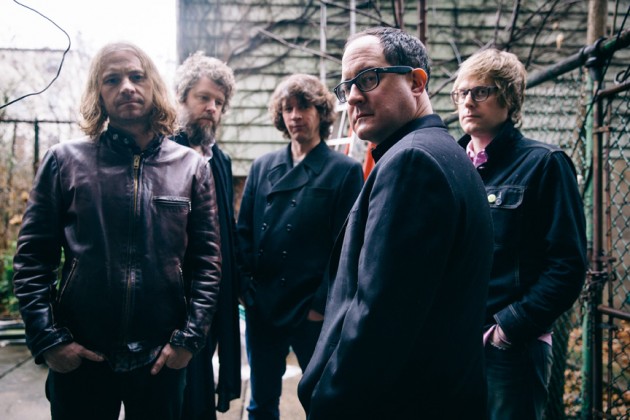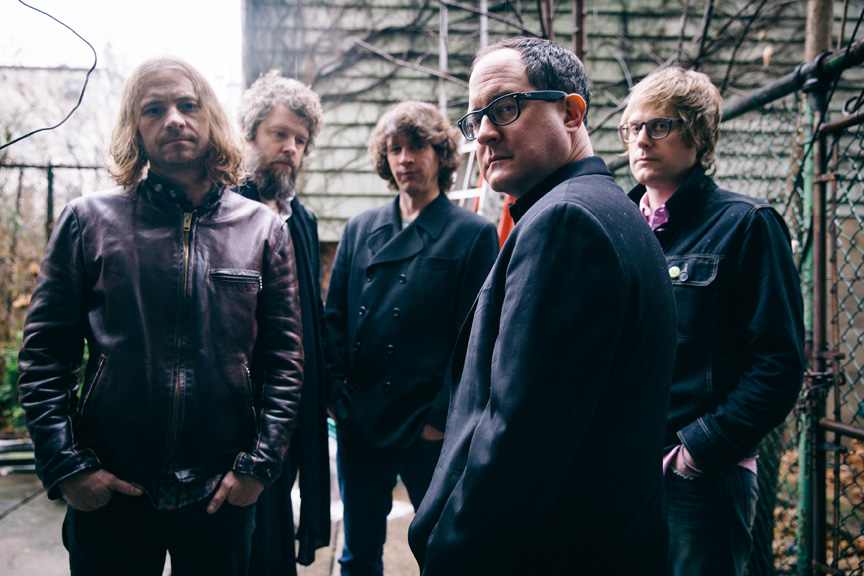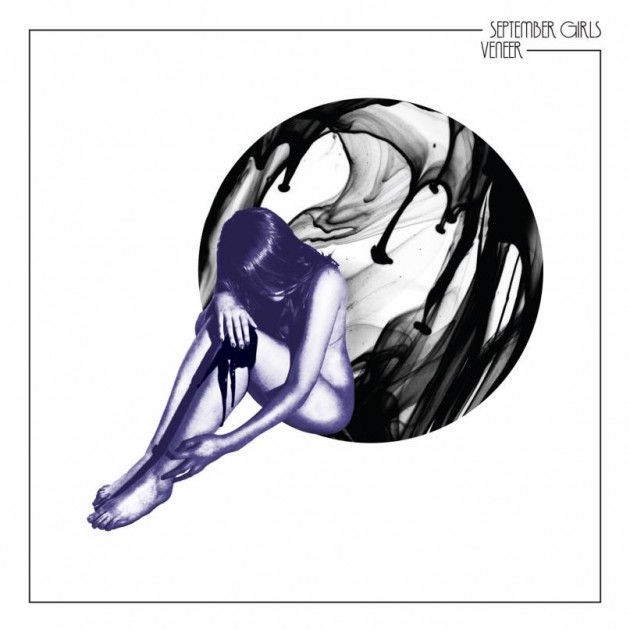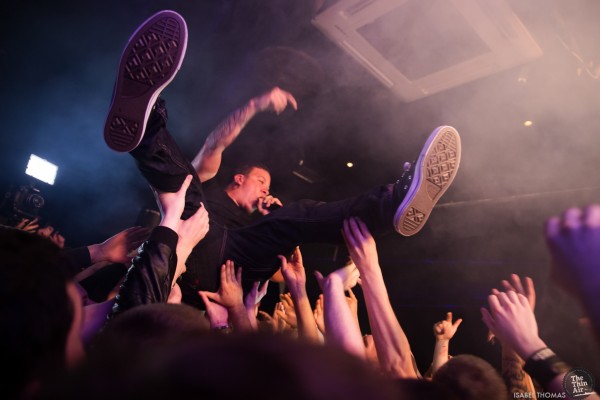Having released their stellar sixth studio album, Teeth Dreams, back in March, Brooklyn indie rock heroes The Hold Steady are experiencing something of a much-deserved resurgence as of late. Formed back in 2004, the Craig Finn-fronted band will stop off in Belfast and Dublin on October 17 and 18 respectively, as part of a forthcoming European tour to promote the aforementioned album. Ahead of those dates, Will Murphy has a chat with Finn about the band’s songwriting process, the recording and release of Teeth Dreams and his support for – wait for it – Queens Park Rangers.
It was about four years between Heaven Is Whenever and Teeth Dreams. I was wondering, what was reasoning for such a long gap because normally you’d been doing an album every two years?
Yeah, that was part of the reason (chuckles). We had made five records in seven years and we had toured really extensively on all of them. By the end of the touring for Heaven is Whenever we were pretty fatigued, we were pretty tired. We needed a break and we took a little break and I made a solo record. When we came back on, it took us a while to get cranked up creatively again. One of the reasons, was we added Steve Selvidge, another guitar player for the touring on Heaven is Whenever, and we really wanted to write and record this record with him, which we did. The only difference is that Steve lives in Memphis while the rest of us live in New York . So there was a kind of a geographic thing where we had to fly him up and get in a room and write and it felt a little more formal than we’re used to. We eventually worked through it but it took us a while to get the material together, maybe a little longer. Also we wrote a lot of songs, we wrote probably too many songs. It wasn’t until we got the producer involved that he said “guys you’re very much ready to make a record. You have plenty of songs, they’re plenty good. Let’s go make this record”. In the end it was four years, but the touring for Heaven is Whenever also took a year and a half so it was really only two and half years in some ways.
What was it like working with Nick (Raskulinecz) – whose last name I cannot even begin to pronounce?
You pronounce it Ras-kah-lin-iks. He’s great. We saw him first in the documentary Sound City that Dave Grohl had made and we really liked him in the movie. He was really sympathetic. He’s kinda this big heavy metal dude, a hard rocker, but he seemed really sensitive. In fact in the movie he tears up a one point talking about this old studio he got his start at. We were like “well that guy seems cool, maybe we could meet him” and our manager knew him from working with the Foo Fighters. So we met him and he was just this boundless, enthusiastic guy. He’s this big guy. He came to our space in Brooklyn and started jumping round the room to our song as we were halfway into it. He’s jumping around waving a drum stick and we were thinking “this guy seems really positive and fun and seems to know what he wants”. He had some really good ideas off the bat and he jumped right in. Right away, we were like “I think this might be the guy”. Sure enough it was a blast and he was great at getting performances. It ended up being a really positive experience.
You mentioned that you wrote a lot of songs for the album and I was wondering what is the writing process like for the Hold Steady? Do you go to Tad (Kubler, guitarist) with a full set of lyrics and he writes a riff around or it is more of a collaborative thing?
It can happen any way, but usually when happens is that Tad comes up with the riffs. He shows them to me and has a couple that go together and look at them like “this one could be the verse and this one might be the chorus”. Then I’ll go through my notebooks, I try to write a little bit each day, and I’ll say “this might go here or there” and then we’ll try to piece them together. In this record, I was touring on the solo record I had made and those guys got together in Memphis and did some writing without me. So some of the songs were musically further along when I heard them than on previous records. Not all of them, but some of them. So that was a little different and they were more developed and really had both guitar parts going. In that sense the music seemed, to me, very tense and claustrophobic a little bit. There was this real tension in the music and that in some ways influenced the lyrics on this record because I started thinking a lot about that tension and anxiety. Anxiety is kind of a big theme of the record.
So much of your writing in the past has been inspired by poetry, novels and just a variety of other cultural sources. What were the main sources you were reading or experiencing when you were writing and recording this record?
Like I said I was really obsessed with anxiety and two things happened. One was I met a doctor at a party, he was a general practitioner, but he said that anxiety was the main reason that over half of his patients come to him now. Then I noticed that the New York Times has an anxiety column now and I was fascinated by that. At the same time about four years ago when we were touring for Heaven Is Whenever, I read Infinite Jest by David Foster Wallace and I got really obsessed with him. I read pretty much everything he wrote, including Infinite Jest twice and all of the interviews he had ever done too. So I become somewhat of a David Foster Wallace follower. He talks a lot about anxiety and I borrowed a couple of concepts for the record. One of them being what he calls the American Sadness which this emptiness that no matter how much stuff you get you can’t fill that void or become happy. That influenced me a lot.
Congratulations on finishing it twice. Those footnotes are not easy.
They aren’t. I found that I got through it once and I understood most of it, but not all of it. Then I felt the second reading helps a lot. That one I did with an online group. I’d check in online just to see the thoughts on it and really helps. But also it’s one of those books that teaches you to read it. It reads much better at the end then it does at the beginning.
You were saying that really wanted to involve Steve on this record. What do feel he brought to the album? Do you think his presence shook up your expectations of what a Hold Steady record should sound like?
I think we traded a keyboard for a guitar in that sense. We don’t have a piano player now, even though there is piano on the record. Now we have two guitars and they way they play together off each other. There is a push and pull that was really the defining sound of this new version of the Hold Steady. When you’re forty three years old and on your sixth record, people expect the mandolins and something a little bit lighter. I think we went out and made our heaviest record. It was the two guitars that really brought that out. There aren’t that many bands that go harder when they get older.
How does Steve fit into the live structure now? Does he fill that void left by Franz?
Yeah, he feels very natural. They are very different kinds of performers. Franz was a very animated performer, but Steve is an incredible musician. I think he helps it become more rock and roll, more Les Paul. He brings this strong big sound with him. We all came from a punk rock thing, but he came from a very musical family and very musical place in Memphis and he brings a different look into some things. Different levels of experience and things that we might not think of. He does a lot of sessions out in Memphis and he brings an extra level of musicianship.
When exactly does the tour for Teeth Dreams start?
It starts in like two weeks. We start in Amsterdam on October 7, I think. I’m going to go over to London and hang out with some friends and see a football match. It’s QPR versus West Ham. I’m a sports fan, so I’ve kind of adopted QPR as my team over there… which is a hard road.
Definitely requires some commitment to follow that to the bitter end.
Yeah, well all my teams in the states are pretty bad so I felt like I should jump on something that was a bit of a struggle.
So which European city do you enjoy playing the most?
For me, in terms of atmosphere, my current favourite is Berlin even though we’re not going there on this tour. I like going everywhere but I definitely think our crowds are better in the UK. We tend to hit a little better in places that speak English so there is no language barrier. I never got to travel before we started the Hold Steady, so it really feels like a blessing to go anywhere across the ocean.
Is there any song or specific moment of a song that just leaps out when you do it live?
‘Stuck Between Stations’ is still one of my favourite songs to play live. There is something about that one that just seems to lift off. ‘Stay Positive’ is another one that I really like to play live. I love putting them at the end. It closes out the night on a good message. Any of the songs with the big moments, anything with the “wo wo wos” because it lets the crowd join in and feel like they’re a part of it. I think that inclusiveness is my favourite part of it. But in the studio, I think the quiet songs are most fun in the studio because you really hear those hushed moments.
How did the Game of Thrones thing come about?
The guys who run the show were really big fans and they wanted to do something musically each season. So The National did one and Sigur Ros did one and they came to us and said, “we’ve got this drinking song and we think you’d guys would be great”. The song was already written because it was in the books, obviously. So it was pretty quick, they said what they wanted, we got what they wanted and we just went and did. I don’t watch the show, I don’t have HBO, but when it was on my phone was off the hook. So it’s very clearly been pretty popular.
Last year, you announced a cover record RAGS EP. I’m curious as to what brought that about?
Well it was a fan club thing. A very good friend and fan of ours passed away and we wanted to come up some which would honour him, raise money for charity and bring the fan club together. We each picked a song, recorded it and anyone who order it became members of the fan club. All of the money from it went to the daughters of this guy who passed away. It was cool thing and I think it showed where we were coming from. We got to pick a song so there was some pub rock, classic rock, punk and it gave people an idea of what we were into and where we were coming from.
Which track was yours?
My track was ‘The Last Thing I Ever Wanted Was To Show Up And Blow Your Mind’ by a band called Those Bastard Souls. It was kind of an obscure indie track from the nineties from this Memphis band. It’s a song I’ve always loved and wanted to do.
Keeping with that theme, are there any records currently that you’ve fallen in love with?
The record I’m into right now is by a band called Protomartyr from Detroit. All Summer I’ve been into this band from Jersey called The Front Bottoms. They’re younger kids with a great lyricist and they’re finding success which is great. They’re a really exciting band.
You financed the EP through Pledge Music. What are your opinions on crowdfunding and do you think there is a future in a model like that?
I think there has to be because really it’s not that much different to a pre-order in many ways. All you’re doing is asking for the money at a different time. I think it’s going to free artists up from the label thing. With the internet, the distribution has been from the labels and think they have less and less to offer. What I think has been interesting with the Pledge thing is how much the fans have responded to it. They were really excited to be a part of it. Everyone just seems really excited to be part of the behind the scenes. I think it is the future.
The Hold Steady turned ten this year. Hypothetically, if the Hold Steady were to stop tomorrow, what do you think would be their resounding legacy? Do you feel there is one at this point?
I think it’s an inclusiveness. I think our fans feel part of something and that was something that we wanted to do from the start. Coming up from punk rock, I always felt there was something great about being part of a scene. What we did was create a straight, classic rock that people can really be a part of. I hope when people come to the shows they do feel part of something, something bigger, and that they’re all connected to rock and roll as a positive thing. Will Murphy
The Holy Steady play Belfast’s Limelight 2 on October 17 and Dublin’s Academy on October 18. Go here to buy tickets.







